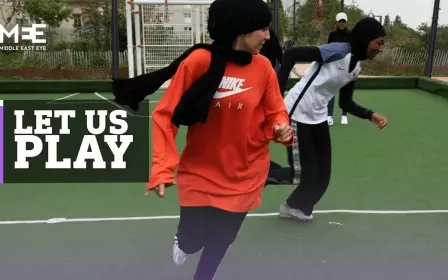India hijab ban: Targeting of Muslim women condemned across the Middle East

A ban on the hijab in schools in the southern Indian state of Karnataka, along with an escalation of religiously motivated attacks against Muslims in the country, has prompted widespread solidarity in the Middle East and beyond.
From Dutch-Palestinian supermodel Bella Hadid to Nobel Peace Prize laureate Malala Yousafzai, public figures and social media users worldwide have spoken out against the discrimination against Muslim women because of their choice of how to dress.
Videos circulating online have shown disturbing scenes of Muslim students being refused entry into school buildings and Muslim women being heckled outside educational establishments.
Young Hindu men and women have been seen brandishing saffron scarves to symbolise their opposition to the hijab.
On Wednesday, footage was widely shared of an Indian bank refusing to allow one of its veiled customers to withdraw money from her account.
New MEE newsletter: Jerusalem Dispatch
Sign up to get the latest insights and analysis on Israel-Palestine, alongside Turkey Unpacked and other MEE newsletters
India’s 200 million Muslim minority community now fears that the hijab ban is infringing on their religious freedom.
The events in Karnataka have triggered a major row, one that has reverberated into the Arab world, sparking protests and social media activism against the ban.
In Kuwait, various protests have taken place over the last few weeks, with demonstrators standing outside the Indian embassy, carrying placards.
Kuwaitis also took their frustrations to social media, starting a campaign using #ExpeltheIndianambassador in both Arabic and English.
The campaign has proven impactful, with the hashtag rising among Kuwait’s trending topics on Twitter.
Others in Kuwait are calling for the boycott of Indian products.
The issue has even received political attention in the country. Last week, a group of Kuwaiti parliamentarians demanded that the government put an immediate ban on the entry of any member of India's ruling BJP party into Kuwait.
In the letter, they wrote, “we can't sit back and watch Muslim girls being publicly persecuted”.
The Association of Muslim Scholars in Iraq has also condemned the hijab ban. In a statement, it denounced the Indian government’s discrimination against Indian Muslim women and restrictions on the hijab.
Protests have also taken place in Turkey where NGOs held a demonstration in Istanbul in front of the Indian consulate, denouncing the hijab ban.
“We don't approve of a ban on the clothes of members of any religion,” human rights activist and lawyer Gulden Sonmez said.
In Tel Aviv, women hosted a demonstration, with one protester sending a message to India’s Muslims saying, “We are all with you, the hijab is our right.”
In a tweet, Nobel Peace Prize laureate Malala Yousafzai wrote, “Refusing to let girls go to school in their hijabs is horrifying. Objectification of women persists - for wearing less or more. Indian leaders must stop the marginalisation of Muslim women.”
Meanwhile, Dutch-Palestinian supermodel Bella Hadid took to Instagram to call out various countries which have made headlines for their position against the hijab.
Writing in her caption to her almost 50 million followers, Hadid said “I urge France, India, Quebec, Belgium, and any other countries in the world who are discriminatory against Muslim women, to rethink what decisions you have made or are trying to make in the future about a body that is not yours.”
Middle East Eye delivers independent and unrivalled coverage and analysis of the Middle East, North Africa and beyond. To learn more about republishing this content and the associated fees, please fill out this form. More about MEE can be found here.




